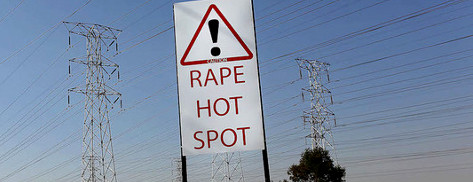As a child, I thought that grownups weren’t afraid of anything. They killed spiders. They didn’t believe in monsters and ghosts. They weren’t scared of dogs or the dark or the deep end of the swimming pool.
Of all the disappointing discoveries of adulthood, the realisation that grownups are in fact very frightened very often — especially of monsters and ghosts — was the one I felt most keenly.
As a teenager, I learned more about the trauma ingrained in our collective consciousness: the unspeakable horror of the Holocaust and the Rwandan genocide, the terror of apartheid, the long violence of bigotry. The solution to world peace seemed simple — people needed to talk and to listen, and they wouldn’t hurt one another anymore.
I still think that, by the way. But I no longer believe it will happen.
On Friday I had another sudden realisation: This world has been hurting its girls and women for as long as we have existed, and it is never, ever going to stop.
Never.
On Friday, I read how soldiers in South Sudan were raping women in place of monetary payment. How the Rhodes Memorial attacker raped a fourth UCT student. How men raped and killed teenager Sinoxolo Mafevuka because she needed the toilet and the closest one was outside, a 100m walk from her home. How men raped 16-year-old Franziska Blöchliger before they beat and strangled her.
No one will protect us from our fear made flesh, from the living monsters and ghosts that hurt us because we are women and we exist.
I did not feel angry or scared when I realised this. The knowledge settled into my chest like a stone, collecting all my rage and grief for these girls who were not saved.

As a journalist, I have written about violence against women innumerable times, stories I am too sad and tired to recount. I interviewed people who have devoted their lives to helping women and children, who were being pushed to the ground by insufficient resources, by the lack of government interest, by the sheer volume of violence they face every day.
One of the things I learned is that there are ways to address the scourge of rape. Much of it involves education. Teach children about consent from a young age. Teach girls that they are equal to boys, that they are in charge of their own bodies, that they are allowed to say no and that their no must be respected.
There are so many things we could do, if only we had the resources and the political will.
Instead, our society believes that it is women’s responsibility to stop rape by stopping rapists. You know, take self-defence classes, don’t walk alone, don’t get drunk, don’t wear a short skirt. Carry pepper spray, carry a stun gun, carry a rape whistle, hold your car key between your knuckles.
Turn your home into a prison and your handbag into a weapon. Never forget you are a target. Always be afraid.
This is what we are taught from the time we are girls. It is said under the guise of protecting us, but it means that when we are raped, it is not the perpetrator who is blamed but the victim. Because she did not do everything exactly right.
Do you understand why living like this is unbearable? Why it cannot be sustained?
The truth is, our biggest threat is not the stranger in the dark alley. It is our brothers, our neighbours, our friends.
I sometimes wonder if the people I know are tired of my writing about this constantly. But I don’t care. I know a few dozen women who are rape survivors. I definitely know others who have not spoken about it. And while it continues to happen to women and girls everywhere — your relatives, your friends, your classmates, colleagues, boss, employees, students — I will continue to write.
I cannot protect them. So I write.



